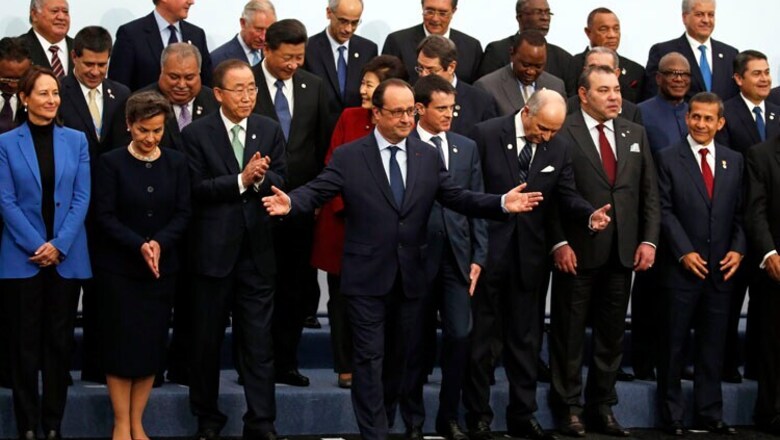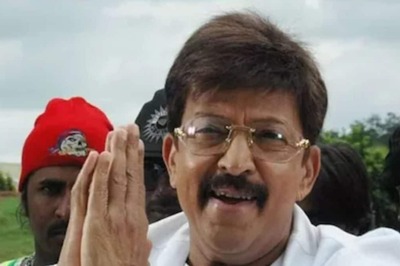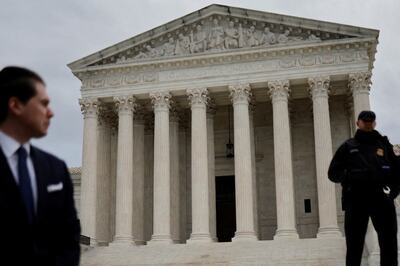
views
World leaders opened an historic summit in the French capital on Monday with "the hope of all of humanity" laid on their shoulders as they sought a deal to tame calamitous climate change.
The heads of more than 150 nations kicked off 12 days of talks in search of an elusive pact that would indirectly restructure the world economy, weaning it off fossil fuels that stoke global warming.
They met at a conference centre in Le Bourget on the northern outskirts of Paris under heavy security following terror attacks in the city which appeared to have galvanised commitment for a climate breakthrough.
It was the largest single-day gathering of heads of state or government in history, the United Nations said.
"Never have the stakes of an international meeting been so high because it concerns the future of the planet, the future of life," French President Francois Hollande said in an opening speech.
"The hope of all of humanity rests on all of your shoulders."
French Foreign Minister Laurent Fabius, the event's host, voiced optimism that rivalries preventing similar efforts to strike a climate-rescue deal over the past two decades could be overcome.
"Success is not yet acquired but it is within our reach," Fabius told the delegates.
Remembering terror
Scientists warn that, unless action to curb greenhouse gases is taken soon, mankind will endure ever-worsening droughts, floods, storms and rising seas, threatening millions with hunger, disease and migration and low-lying island nations with oblivion.
But world leaders also vowed to forge an ambitious deal in honour of the 130 people killed in the November 13 attacks in Paris, claimed by the Islamic State group.
The leaders began their talks with a minute of silence to remember the victims.
US President Barack Obama's first act after touching down in Paris early on Monday was to visit the scene of the worst carnage of the terror attacks at the Bataclan concert venue.
He then met with Chinese President Xi Jinping before the summit started, with his focus turned to deepening co-operation between the world's two biggest emitters of the greenhouse gases that cause global warming.
"As the two largest carbon emitters, we have both determined that it is our responsibility to take action," Obama said as he sat alongside Xi.
Stumbling blocks
The United Nations has hosted annual conferences to tackle the vexed global warming issue since 1995, but all previous efforts have foundered, primarily due to deep divisions between rich and poor nations.
Many poor nations insist rich countries bear the most responsibility for tackling the problem because they have burnt the most fossil fuels since the Industrial Revolution on their way to prosperity.
"Justice demands that, with what little carbon we can still safely burn, developing countries are allowed to grow," Indian Prime Minister Narendra Modi wrote in a column published in the Financial Times on Monday before the summit opened.
"The lifestyles of a few must not crowd out opportunities for the many still on the first steps of the development ladder."
But the United States and other developed nations insist more must be done by China, India and other emerging countries, which are voraciously burning coal -- the most carbon-emitting of the main fossil energies -- to power their fast-growing economies.
In a timely illustration of the immediate ramifications of rampant coal burning, dangerous smog enveloped Beijing and other parts of northern China on Monday.
The Paris negotiations, taking place under the banner of the UN Framework Convention on Climate Change (UNFCCC), are due to wrap up on December 11, but the annual talks are notorious for recrimination and delay.
Potential stumbling blocks are many, ranging from providing finance for climate-vulnerable and poor countries to scrutiny of commitments to curb greenhouse gases and even the legal status of the accord.
Still, important progress has been made. A key success has been a roster where 183 nations have submitted voluntary pledges for reducing greenhouse-gas emissions.
UNFCCC chief Christiana Figueres said these provide the architecture for more ambitious efforts that could eventually reach the goal of limiting warming to less than two degrees Celsius (3.6 degrees Fahrenheit) from pre-Industrial Revolution levels.
'No planet B'
To pressure world leaders into forging an agreement, more than half a million people participated in climate protests around the world over the weekend.
"There is no planet B" and "Our Children Need a Future" read placards held by some of the 50,000 people who turned out in London's Hyde Park, in scenes replicated across the world.
"The charge from the streets for leaders to act on climate has been deafening, with record numbers turning out across the world," said Emma Ruby-Sachs, campaign director for Avaaz, one of the organisers.
French authorities had banned protests in Paris due to security fears following the terror attacks.
But in a show of defiance and determination to have their voices heard on climate change, thousands of people in Paris gathered to create a two-kilometre (1.2-mile) human chain.
Their stand was disrupted, however, when a band of anti-capitalist militants infiltrated the protests, leading to clashes with riot police which saw hundreds of arrests. Some 317 people were in custody, police sources said on Monday.

















Comments
0 comment